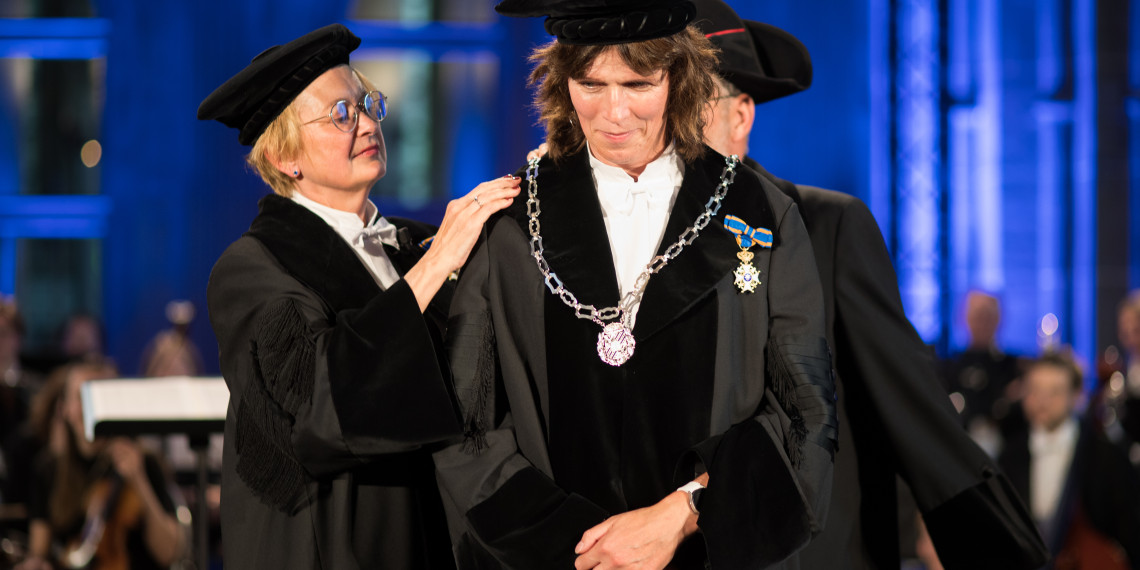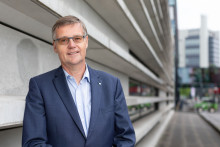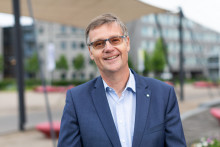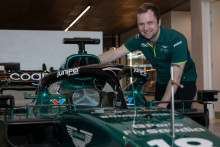The UT and the University of Groningen share some similarities, but there are also clear differences. One of them being the location where the Executive Board is housed. Whereas the three UT board members are based at the front side of the campus in Vleugel, the situation is a little different up north. Due to renovations to its accommodation on Oude Boteringestraat, the Groningen Executive Board is temporarily working from behind the front door of a characteristic house in the heart of the city centre, at Muurstraat 14, a street that runs parallel to the houseboats on the waters of Lopende Diep.
Not far behind that front door, Jacquelien Scherpen recently settled into room 0013. ‘But I’ll be moving to another room soon. I’m rather attached to my books, which are all packed up in those moving boxes over there, but there’s no room for them here.’ On Friday, the 1st of September, during a ceremony in a packed Martini church, Scherpen was handed the rector’s chain by her predecessor Cisca Wijmenga. ‘I dove headlong into all kinds of dossiers and for two days a week, I tried to wrap up my old job. At least, that was the plan. In practice, everything overlapped and got mixed up, but things have more or less settled down by now.’
Twente or Groningen
Scherpen, who is originally from Schoonebeek in Drenthe, studied and obtained her PhD at the UT between 1984 and 1994. Her parents were not keen on the idea of her studying anywhere beyond Groningen or Twente. The enthusiastic information session on applied mathematics in Enschede proved to be the deciding factor for her. ‘I had no idea what I wanted to do. I thought I might like to work at a bank in the future. In Twente, there was an option to specialise in a type of financial mathematics later in the programme. That seemed like something for me, though in the end I didn’t even choose that specialisation.’
‘We’re initiating discussions with Twente about more cooperation as well’
The mathematician looks back fondly on her Twente years. She was an avid volleyball player at Harambee, lived in multiple student houses - including one on Bilderdijkstraat - and was actively involved in study association Abacus. ‘Together with my three former housemates, we recently visited the house on Bilderdijkstraat during a city trip. The only change was that the residents had squeezed in an extra room.’
What has stayed with the Rector the most from her years in Twente? ‘Maybe it would be a bit much to call it one big family, but that’s often what it felt like. It was a close-knit community. Of course, you didn’t hang out with everyone and at 77 students, our cohort was relatively large, but you could just drop in anywhere and it seemed like everyone knew each other. Another great thing was that lecturers also often joined us for the monthly get-togethers.’
(Text continues below the photo.)

Despite her enjoyable time in Enschede, Scherpen relocated to Delft to focus on electrical engineering after obtaining her PhD in systems and control theory - with her dissertation entitled Balancing for Nonlinear Systems. ‘I was advised to go somewhere else for a while to get out of my own bubble. It turned out to be good advice because I spent some wonderful years in Delft. After a while, I even felt like a true Delft resident.’
Crossroads
At several points in her career, Scherpen found herself at a crossroads. Although she was tempted by the idea of working abroad, she turned down the opportunity to switch to the corporate life several times. However, in 2006 she decided to leave Delft for Groningen. ‘Not a technical university, but my discipline had always been highly regarded in Groningen. My family situation was one of the reasons I made that choice. My husband and I both grew up in the east and wanted our children to have the same sense of space growing up that we had had there. The Randstad was so crowded.’
'Fortunately, times change, but sometimes they change too slowly'
As a professor, Scherpen started the research unit Discrete Technology and Production Automation and focused on systems and control engineering. In 2013, she also became director of the Engineering and Technology institute Groningen (ENTEG). Furthermore, she founded the Groningen Engineering Centre and in 2018, she joined the national engineering deans’ consultation. In 2020, the international IEEE, the Institute of Electrical and Electronics Engineers, appointed her a Fellow and she was also appointed Captain of Science of the top sector High Tech Systems and Materials.
And then, 2023 arrived. Scherpen received the Prince Friso Engineering Award from Princess Beatrix herself, earning her the title of Engineer of the Year. It came as a complete surprise. ‘It brings extra exposure, not just to me, but to the university as well. It shows that I was able to contribute something to the image of the engineering field and I consider that an honour.’
She speaks about her appointment as Rector with the same modest pride. After Wijmenga, Scherpen is the second woman on the long list of Rectores Magnifici. ‘I firmly believe that a team with more diversity comes up with different solutions than less diverse teams. And I mean diversity in the broadest sense of the word, not just in terms of men and women. What helps is that I know the challenges you might run into as a woman. I understand those better than my colleagues would. I know what it’s like to be the only woman in the workplace, for example at electrical engineering in Delft. Fortunately, times change, but sometimes they change too slowly. This is something I’d like to contribute to. Cisca was already doing that and I’m happy to continue her work in that area.’
‘We encourage all students to think globally because that’s what’s needed’
Scherpen says that becoming Rector was never her goal. When the UT was looking for a successor to Thom Palstra a few years ago, the thought of returning to Twente never even crossed her mind. However, in the spring she decided to vie for the position of Rector in Groningen. ‘I have become increasingly interested in policy matters in recent years, but I wanted to establish myself academically first, before thinking of such a position. Plus, the timing was better for me personally.’
A complete package of solutions
Scherpen sees the major challenges society faces as motivation for her new role. ‘I feel that now is the time when we, as universities, can and must contribute to the enormous challenges ahead. Especially as UG - with our profile combining so many disciplines from all faculties - we want to create a complete package of solutions. I see a lot of opportunities there.’
At the same time, Scherpen is aware that a challenging period lies ahead. UG is facing a period of cutbacks, predecessor Wijmenga expressed her concerns about the loss of dialogue during a farewell interview, and in Groningen, too, there is apprehension about The Hague’s future plans for higher education and discussions about internationalisation. ‘It is a cause for concern. We’ve been working on becoming more inclusive together for years. We encourage all students to think globally because that’s what’s needed. It feels like we’re being forced to take a step back now.’
The Rector believes that issues such as housing and access to education for Dutch students require critical attention, but she fears the consequences of a sledgehammer approach. ‘It’s happening too fast. Moreover, student numbers are declining demographically, the population is ageing and there are substantial labour market shortages that will not improve any time soon, for example in engineering. Not to mention our role in the region, which is comparable to that of Twente. That’s why universities need to cooperate to an even greater extent. Fortunately, this is happening more and more. We’re initiating discussions with Twente about more cooperation as well.’
Scherpen also advocates a more stable funding of education. ‘In the current system, someone who studies at a university but turns out not to fit the academic approach of that programme, chooses another university programme. It would be much better for the country if that person entered higher vocational education instead, but our funding system doesn’t support that.’
These are the challenges that Scherpen and her colleagues will address in the coming years, preferably in alliance with the other universities wherever possible. Will she ever consider returning to Twente? ‘When my husband and I left Enschede we said to each other: when we retire, we will return to live here. Will things really work out that way? Who knows.’








